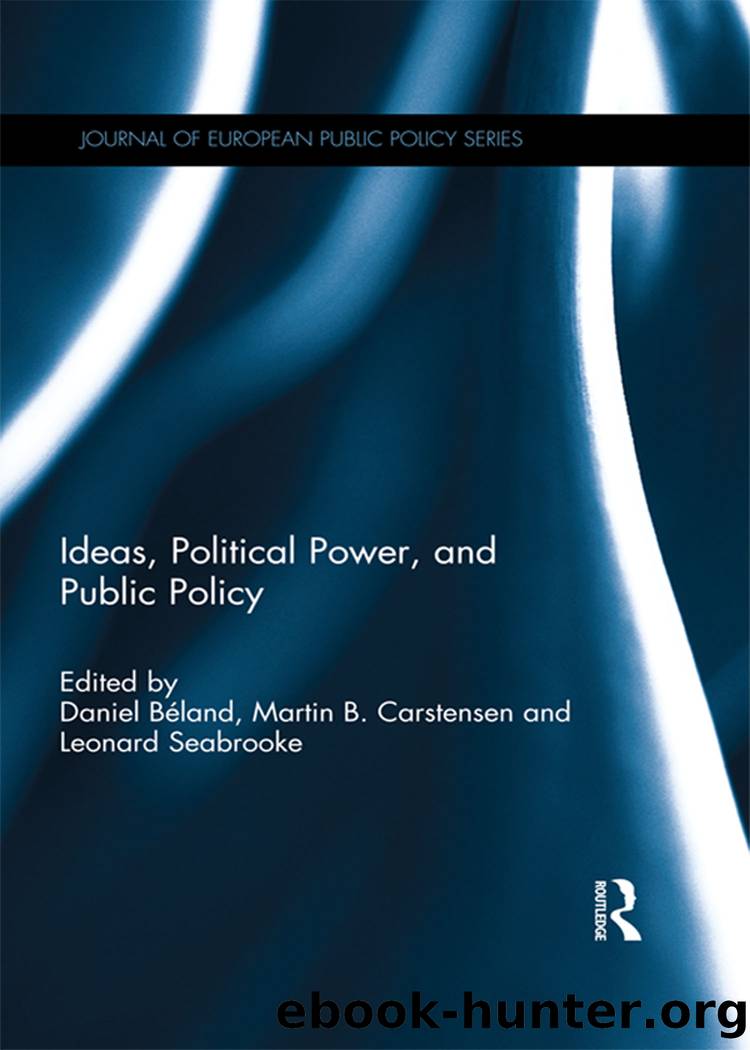Ideas, Political Power, and Public Policy by unknow

Author:unknow
Language: eng
Format: epub
ISBN: 9781138699007
Google: -LuxjwEACAAJ
Goodreads: 29525274
Publisher: Routledge
Published: 2016-09-20T10:01:55+00:00
THEORETICAL FRAMEWORK
The role of economists as agents of globalization is often understood as mostly unidirectional: intellectual models are generated in American or North-West European centers of power and then exported to the periphery. Thus, a number of studies have noted that graduate training in American economics departments shapes the professional identities and preferences of policy players and academic economists worldwide (Colander 2005; Fourcade 2006). Similarly, foreign economists trained in prestigious US academic institutions often become economic policy leaders in their own countries. This dynamic was at work in the story of the Chicago Boys (Babb 2001; Markoff and Montecinos 1993), with more recent scholarship arguing that the same happened in other parts of the world as well (Chwieroth 2010).
Others have noted that things are not always this simple. Dezalay and Garth (2002), for example, argue that the transmission of economic ideas from core to periphery also represented the extension of Western intellectual âpalace warsâ to the Global South. Similarly, Marion Fourcadeâs account of the internationalization of the economics profession takes the dynamic nature of diffusion into account. Fourcade argues that the ongoing reconstruction of economies worldwide is âsymbiotically related to the ongoing transformation of the intellectual and professional jurisdictions of economistsâ (Fourcade 2006: 183â4) â a claim that also serves as the departure point of this account, albeit with certain modifications as argued below.
Fourcade posits that three factors have been critical to the deep institutionalization of the economics profession on a global scale. The first was the establishment of a broadly universalistic rhetoric, under which âeconomics knowledge appeared inherently transferable and âtransformative,â both politically and institutionally, thereby authorizing easy replication and diffusion independently from the national contextâ (Fourcade 2006: 156). More concretely, this universalization of economic knowledge rested on mathematical formalism, methodological universalism and theorizing that treated social units as comparable.
Second, and closely connected to the process of rhetorical universalization, was the transformation of economic knowledge into a technology of political and bureaucratic power. Originally the nation state was the locus of this transformation: in the first half of the twentieth century, economics was incorporated into the toolkit of governments so that economic outcomes might be engineered to suit statist political goals. Ironically, with the resurgence of market-centric neoclassical economics in the 1970s, the nation state was to an extent pushed out of this equation. As a result, the economics profession not only superseded its national loci, but also played a role in circumscribing the economic tools available to nation states. This coincided and dovetailed with the emergence of a transnational capitalist class with considerable lobbying power (see also van Appeldoorn 2002; Van der Pijl 1998).
Third, Fourcade argues that the existence of transnational linkages, or networks, centered in the United States, played an important role in the internationalization of the economics profession. Here, she stresses the importance of education in mediating the relationship between core and peripheral states. For example, the fact that in the year 2000 more than half of all students pursuing a PhD in economics in American
Download
This site does not store any files on its server. We only index and link to content provided by other sites. Please contact the content providers to delete copyright contents if any and email us, we'll remove relevant links or contents immediately.
The Secret History by Donna Tartt(19092)
The Social Justice Warrior Handbook by Lisa De Pasquale(12191)
Thirteen Reasons Why by Jay Asher(8912)
This Is How You Lose Her by Junot Diaz(6889)
Weapons of Math Destruction by Cathy O'Neil(6281)
Zero to One by Peter Thiel(5802)
Beartown by Fredrik Backman(5756)
The Myth of the Strong Leader by Archie Brown(5509)
The Fire Next Time by James Baldwin(5448)
How Democracies Die by Steven Levitsky & Daniel Ziblatt(5219)
Promise Me, Dad by Joe Biden(5154)
Stone's Rules by Roger Stone(5088)
A Higher Loyalty: Truth, Lies, and Leadership by James Comey(4964)
100 Deadly Skills by Clint Emerson(4927)
Rise and Kill First by Ronen Bergman(4790)
Secrecy World by Jake Bernstein(4753)
The David Icke Guide to the Global Conspiracy (and how to end it) by David Icke(4720)
The Farm by Tom Rob Smith(4514)
The Doomsday Machine by Daniel Ellsberg(4490)
